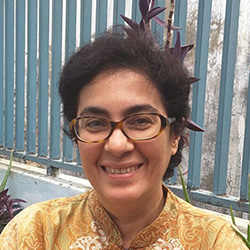
A recent private sector initiative to help fund sustainable natural rubber plantations in heavily degraded land areas of Indonesia has received much praise and caution. The initiative, issued by the Tropical Landscapes Finance Facility (TLFF) in February this year, was a multi-tranche USD 95 million sustainability bond – and it marked the first ever sustainability bond issued in Southeast Asia.
But first, what is a sustainability bond?
“A sustainability bond is a bond that is in line with the International Capital Market Association (ICMA) guidelines,” says the Meizani Irmadhiany, Director of PT Royal Lestari Utama (RLU), a joint venture between Michelin and a subsidiary of the Barito Pacific Group and the receiver of this bond.
“And It has to show clear social and environmental benefits. That is why this is such an important project – it shows positive contributions to sustainable development activities.”
Aside from being the first transaction of its kind in the region, the issuing of the bond also opens the door for a different type of financing for rubber plantations in Indonesia, and one that can support profitable expansion through private investment while still keeping sustainable practices at the forefront.
“The funding scheme is interesting in that it connects institutional investors aiming to move toward more responsible lending practices with specific companies that want to embrace sustainable supply chains,” says Pablo Pacheco, Principal Scientist at the Center for International Forestry Research (CIFOR). “These companies want to contribute to conservation as well as support social inclusion in the value chain.”
It’s no secret that private investment is fundamental to the growth of commodity crops such as rubber. Pacheco is supportive of the new bond, he says, because it channels this investment to companies over long periods of time and with reasonable interest rates, which helps achieve sustainability goals.
“This allows companies to invest in activities – such as reforestation or tree-crop plantations – that require longer periods to deliver financial benefits to companies and other stakeholders involved,” he says. “This particularly helps companies with goals to reverse land degradation.”
WILD AWARENESS
Sustainability standards have not developed for rubber as quickly as they have for other commodities. Pacheco says this is because the sector has not been seen as responsible for any major environmental threats, such as in the case of the oil palm sector. However, the pace of change is quickening.
“Michelin has subscribed to a sustainable natural rubber policy that embraces the goals of respecting people and protecting the environment,” he says.
RLU has two concession areas – one in Jambi, Sumatra, and the other in East Kalimantan – with a combined area of 88,000 hectares, roughly 45,000 of which will be set aside to aid community livelihoods and conservation efforts.
“The areas have been heavily degraded in the past decade but are still home to an array of biodiversity and protected plant and wildlife species,” says Irmadhiany. “The challenges [of the two concessions] are different, but the project strives to produce natural rubber in a way that is climate smart, wildlife friendly and socially inclusive.”
The concessions include important riparian landscapes and High Carbon Stock and High Carbon Value forests. The concession in Jambi, adjacent to two World Wildlife Fund (WWF) concessions, forms a contiguous buffer zone protecting the Bukit Tigapuluh National Park – one of the last remaining homes to Indonesian elephants, tigers and orangutans. RLU is collaborating with WWF to assess the state of these areas.
“This is one of the last remaining lowland national parks in Sumatra that is still intact,” says Irmadhiany. “The idea is to create a productive and long-term buffer to the park through development of sustainable livelihoods and conservation, and also disincentivize activities that are not sustainable, like illegal activities.”
SOCIAL STUDIES
At maturity the rubber plantations will provide approximately 16,000 fair-wage jobs to local communities. Pacheco says that this social purpose is an important component to achieving the environmental and economic goals.
“In the specific case of Bukit Tigapuluh, the investment is aimed at providing sources of employment for the surrounding communities,” he says. “This looks like a model to follow. Michelin and Barito Pacific Group will secure a sustainable supply of rubber that results in positive social and conservation outcomes.
“It would be expected,” he adds, “that the right monitoring frameworks will be in place in order to asses progress.”
Perhaps what makes the bond most unique, however, is that it is designed to be profitable.
“To be able to maintain a development concession over 60 years and pay back our loans, profitability is the key, because it shows our ability to mobilize funds and keep our company financially sound,” says Irmadiany. “Profitability is at the heart of sustainability.”
We want you to share Forests News content, which is licensed under Creative Commons Attribution-NonCommercial-ShareAlike 4.0 International (CC BY-NC-SA 4.0). This means you are free to redistribute our material for non-commercial purposes. All we ask is that you give Forests News appropriate credit and link to the original Forests News content, indicate if changes were made, and distribute your contributions under the same Creative Commons license. You must notify Forests News if you repost, reprint or reuse our materials by contacting forestsnews@cifor-icraf.org.















